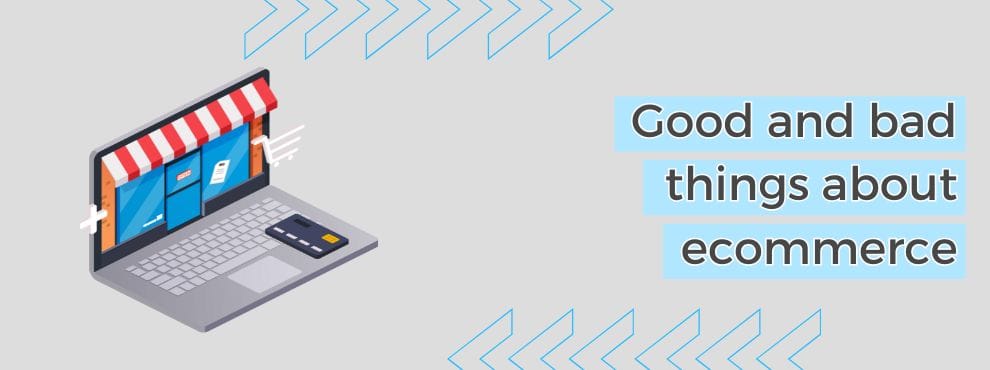In recent years, e-commerce has experienced explosive growth. More and more entrepreneurs and companies are betting on this sales modality to reach their customers quickly and efficiently. Technological development and digitalization have facilitated the creation of online stores, making it easier than ever to sell products and services over the Internet. However, not everything is positive in this business model, as there are also challenges and disadvantages to consider before embarking on the world of ecommerce. In this article, IDX Innovadeluxe tells you about the advantages and disadvantages of ecommerce.
Table of contents
Benefits of ecommerce
Access to a global market
One of the main benefits of ecommerce is the reach it allows companies. Traditionally, businesses were limited geographically by their physical location, but ecommerce has eliminated this barrier, allowing companies to offer their products or services in a global market. The ability to sell internationally has led many companies to grow exponentially, gaining access to customers that would otherwise be impossible to reach.
In addition, access to a global market makes it possible to diversify sources of income and makes it easier for small entrepreneurs to compete with large companies, since the Internet has democratized access to information and marketing tools that were previously only available to large corporations.
Reduced operating costs
Setting up a physical store involves significant costs in terms of rent, maintenance, personnel, among others. On the other hand, an ecommerce allows to drastically reduce these costs. The savings in physical infrastructure and the possibility of automating sales processes and inventory management means that a digital business can operate efficiently with less investment.
In addition, e-commerce allows the use of various strategies to minimize costs, such as dropshipping or sales on demand, which has proven to be an advantage for entrepreneurs who want to start a business with minimal investment.
Flexibility and 24/7 availability
E-commerce offers users the possibility of buying at any time, without time restrictions. This flexibility translates into more sales for businesses and greater convenience for customers, who can purchase products or services when they need them without depending on the opening hours of a physical store.
For business owners, this also represents the advantage of being able to manage their store remotely, without the need to be physically in an office or premises. With a good Internet connection, they can monitor their store’s performance, track sales, and make adjustments to the marketing strategy no matter where they are.
Disadvantages of ecommerce
High competition
Simplified access to ecommerce has led to a significant increase in competition. Opening an online store is relatively simple, which has led to the creation of a huge number of stores in almost all sectors. Therefore, standing out among so many alternatives can be a major challenge for entrepreneurs.
Fierce competition forces companies to invest in digital marketing strategies to position their stores, optimize their presence on search engines, and stand out on massive sales platforms. This pressure makes it essential to have a solid plan to capture the attention of the target audience.
Lack of personal interaction
One of the big differences between a physical store and an online store is the lack of face-to-face interaction with customers. In a traditional store, salespeople can guide the customer, solve their doubts in real time and provide a personalized shopping experience. In ecommerce, this interaction tends to be less direct and more automated, which can be a disadvantage for products or services that require personalized advice.
To mitigate this disadvantage, many companies choose to integrate live chat systems, personalized assistance via chatbots or 24/7 customer support services, but the experience still may not be the same as in a physical store.
Logistical and security issues
E-commerce comes with logistical challenges, from inventory management to product shipping. Logistics is a crucial aspect of ecommerce, as any inconvenience can result in delays, damaged products or lost shipments. For customers, uncertainty in delivery times or the possibility of a product arriving in poor condition can be a source of distrust.
In addition, security is a critical aspect in this environment. Fraud, identity theft and cyber attacks are latent risks in online transactions. Therefore, businesses must invest in robust security measures, such as SSL certificates, secure payment gateways, and anti-fraud systems, which implies an additional investment.
Ecommerce challenges for companies
Technological adaptation
Although e-commerce offers many advantages, it requires continuous technological adaptation. The dynamism of the Internet and new digital marketing tools force companies to keep up to date in order to remain competitive. The creation of a functional and attractive online store, as well as the implementation of inventory management systems, integration with payment gateways, and optimization of the website for mobile devices, are tasks that require specialized technical knowledge.
Therefore, it is essential for companies to have the support of experts in store design and digital marketing to ensure optimal performance of their business. At IDX Innovadeluxe, for example, we offer a comprehensive service for the creation of online stores that allows entrepreneurs to focus on growing their business without worrying about the technical aspects.
Dependence on external platforms
In many cases, ecommerce companies depend on external platforms to market their products. Stores like Amazon, eBay or platforms like Shopify have become great allies for entrepreneurs, but this dependence can also represent a disadvantage, since the rules and policies of these platforms can change without notice.
In addition, the commissions and fees they charge for the sale of products can reduce the profit margin of businesses, forcing them to optimize costs in other areas to maintain profitability.
Conclusion
Ecommerce has transformed the way we buy and sell products, opening up a range of possibilities for both entrepreneurs and consumers. Among its main benefits are access to a global market, reduced operating costs, and the flexibility to sell 24/7. However, it is not without its challenges, such as high competition, lack of personal interaction with customers, and logistical and security issues.
To succeed in this environment, it is essential for companies to have a solid business plan, a good digital marketing strategy and the right tools to manage their online store. Also, constant updating and the ability to adapt to new technologies are key to staying ahead of the curve.
At IDX Innovadeluxe, we understand the challenges of e-commerce and offer specialized solutions for the creation of online stores and the development of digital marketing strategies, ensuring that our clients can maximize their chances of success in this competitive market.
Related Posts







Deja un comentario